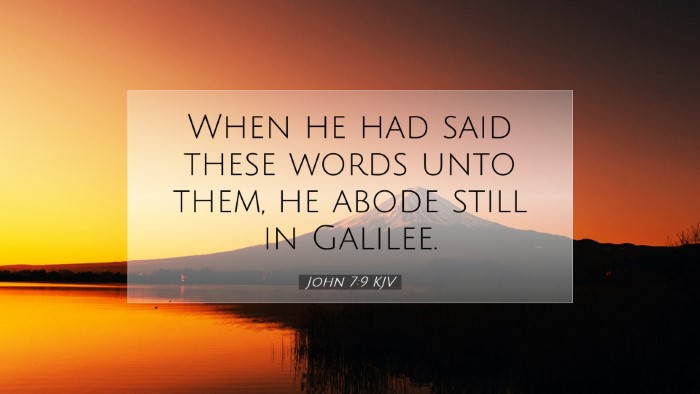Bible Commentary on John 7:9
Verse: "When he had said these words unto them, he abode still in Galilee." (John 7:9)
Introduction
This verse occurs in a pivotal moment of the Gospel of John, where Jesus grapples with public perception, rejection, and the implications of His mission. This commentary draws from the insights of renowned biblical scholars and commentaries, presenting a comprehensive analysis targeted at pastors, students, theologians, and Bible scholars.
Contextual Analysis
In the broader narrative, the setting of John 7 presents Jesus at a critical juncture in His ministry, before the Feast of Tabernacles. This feast was significant in Jewish religious life and attracted many pilgrims to Jerusalem, increasing the tensions surrounding Jesus' ministry as he navigated both His divine calling and the socio-political realities of His time.
Matthew Henry's Commentary
Matthew Henry emphasizes the relational dynamics at play, noting that Jesus' decision to remain in Galilee, rather than accompanying His brothers to the Feast, signifies His understanding of His mission and timing. Henry underscores this as a profound action by Jesus, grounded in His divine purpose rather than familial or societal expectations.
- Divine Timing: Jesus knew that His time for public proclamation had not yet come, which suggests a critical aspect of His obedience to the Father’s timing.
- Rejection: Henry further mentions that the brothers of Jesus did not truly believe in Him, and thus, their insistence for Him to go to the feast reflects a lack of understanding of His identity.
Albert Barnes' Insights
Albert Barnes adds depth to the understanding of the sociocultural implications by noting that during this era, the pressure to conform to social expectations would have been immense. Jesus’ refusal to go at the insistence of His brothers speaks to His prioritization of divine authenticity over human approval.
- Sociocultural Dynamics: The passage illustrates the tension between familial loyalty and divine purpose.
- Spirit-Directed Work: Barnes emphasizes that Jesus operated under divine guidance, showcasing His independence from human manipulation and societal pressures.
Adam Clarke's Perspective
Adam Clarke delves into the theological implications of Jesus' behaviors and interactions during this critical time. He posits that Jesus’ choice to remain in Galilee affirms His mission's seriousness, portraying Him not just as a teacher but as the incarnate Word who understands the broader narrative of salvation history.
- Incarnational Authority: Clarke underscores that Jesus’ work cannot be understood merely through the lens of public perception but rather through His divine authority and nature.
- Significance of Seclusion: By staying behind, Jesus demonstrates the importance of solitude in seeking God's will—a lesson for believers about the necessity of withdrawing from the clamor of public life to ensure alignment with divine purpose.
Theological Reflections
Examining John 7:9 through these commentaries reveals profound theological insights.
1. Obedience to Divine Will
This passage teaches the importance of restraining our actions based on divine revelation rather than human expectation. It exemplifies Jesus’ commitment to God's plan, which calls believers to seek God’s direction in their own lives, often contrary to personal desires and societal pressures.
2. The Tension of Public Ministry
Jesus' avoidance of the public celebration highlights the challenges inherent in public ministry. The nature of the Gospel often leads to misunderstanding and rejection, as seen with His brothers. This serves as a sobering reminder for contemporary ministers to be anchored in their calling despite opposition.
3. The Call to Intimacy with God
Jesus’ choice to remain in Galilee encourages believers to embrace periods of solitude and prayer. The necessity of reconciling one's mission with divine timing is a theme threaded throughout Scripture that this commentary illuminates.
Conclusion
In reflecting on John 7:9, we observe profound insights concerning obedience, the complexity of public ministry, and the necessity of intimacy with God. Through the reflections of Matthew Henry, Albert Barnes, and Adam Clarke, we are reminded of the divine narrative at play in our lives, encouraging a more profound understanding of our relationship with Christ and His call upon our lives.


